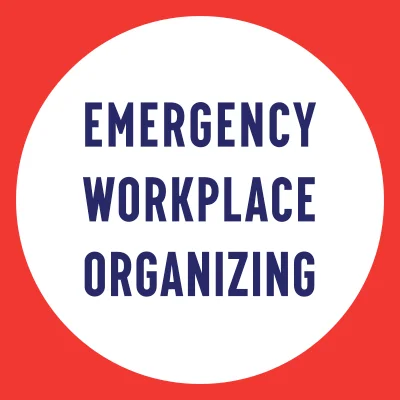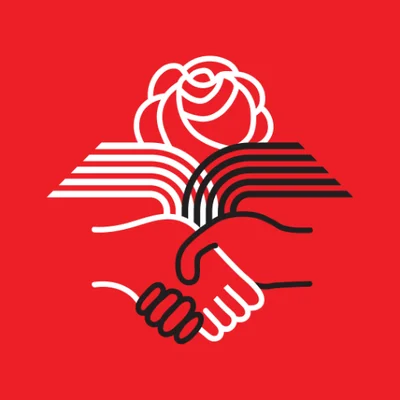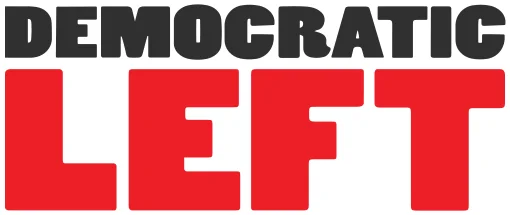

Will ICE ignite a mass strike in Minnesota?
Labor federations have called for a day of protest January 23. The momentum is growing from mass protests and building on long-term organizing.
The post Will ICE ignite a mass strike in Minnesota? appeared first on EWOC.


The Cloud is Material: The Threats and Costs of Data Centers


A Socialist Repaired My Brake Light and All I Got was a New View on Policing


The New Colonialism: A Review of Karen Hao's Empire of AI


Brian Owendoff’s One Big Club (You Ain’t In It)
Brian Owendoff sent racist text messages about Portland City Councilors to a group chat of local pro-corporate political agitators. Our research reveals he’s just one node in a network of powerful people trying to cut taxes for the rich, balloon the police budget, and make it harder for Portlanders to survive.

Brian Owendoff, the commercial real estate developer and recently-unmasked bigot, is many things to many people.
To the City’s well-heeled real estate class, he’s a longtime wheeler and dealer of Portland’s prime commercial parcels. To the Portland Metro Chamber (Portland Business Alliance) he’s a former registered lobbyist and frequent collaborator. Owendoff is also a noisy critic of the Left; he’s published dozens of articles to his Substack attacking DSA.
The Owendoff network is far-reaching. Democratic Party elites like City Councilor Dan Ryan rely on his counsel. Corporate power players like Jordan Schnitzer have rubbed elbows with Owendoff in multiple board roles over the past decade-plus. He’s also a central figure in the emerging ecosystem of right-wing and corporate dark money PACs trying to intervene in Portland’s elections.
Online Agitator
Tuesday’s revelations, first reported by the Portland Mercury, was not the first time Owendoff made headlines for disparaging local politicos. Years before he called Portland City Councilor Angelita Morillo a “burrito”, Owendoff was in hot water for attacking another sitting Portland official. In 2011, Owendoff was fired from his job at real estate firm C.B. Richard Ellis after he was linked to anonymous comments posted to the OregonLive website, which disparaged then-Mayor Sam Adams.
Despite his toxic political persona, Owendoff’s rise to become a powerful real estate and influence broker continued unabated.
Owendoff is currently a member of and contributor to the real estate industry’s latest political venture, the Revitalize Portland Coalition (RPC). RPC is a coalition of interests who benefit from Portland’s housing and homelessness crisis, led in part by real estate magnate Jordan Schnitzer. The Coalition spent lavishly to sink Measure 110 and has previously endorsed a slew of corporate-friendly candidates, including bike cop Eli Arnold and Bob Weinstein (more on Bob below), both of whom lost their recent City Council races.
Another Owendoff connection: Schnitzer Industries has long occupied a board seat at the Portland Metro Chamber, where Owendoff was formerly a registered lobbyist and board member.
Big Business

Schnitzer and PRC together represent a significant nexus of power in Governor Tina Kotek’s effort to sabotage Preschool for All, which is also a frequent target of the PACs in Owendoff’s orbit.
Among those invited to the group-chats where Owendoff sent racist text messages last week were a host of right-wing political hopefuls and activists with their own ties to Portland’s business lobby.
Bob Weinstein co-founded dark money PAC Partnership for Progress (PfP) with failed City Council and County Commission candidate Vadim Mozyrsky. PfP promoted Eli Arnold, the bike cop endorsed by Schnitzer’s Revitalize Portland Coalition. Arnold is also an Owendoff group chat member.

The incestuous political relationships within Portland’s ruling class are headspinning, but no analysis would be complete without reference to Vikki Payne. Payne is another Owendoff group-chat participant, who founded the Future Portland PAC to attack local labor unions and non-profits.
Dark Money
Until she was fired last year, Payne worked for the campaign and office of Multnomah County Commissioner Julia Brim-Edwards. According to the Mercury, “…while Payne was working for Brim-Edwards, Future Portland propped up Brim-Edwards’ proposed legislative policies and statements…”
Despite her outside support for Brim-Edwards’ priorities, including her longtime effort to cut Preschool for All, Payne got the axe after being caught hosting PAC events on County time.
Payne isn’t just an Owendoff compatriot. Future Portland is a “pragmatic partner” of the Schnitzer-led Revitalize Portland Coalition and the right-wing Northwest Fresh podcast, hosted by now-fired Dan Ryan staffer Andy Chandler (more Councilor Ryan public records to come!). Northwest Fresh is a regular platform for local anti-trans activists, Republicans, and anti-public school advocates, as well as current City Council member Dan Ryan and Mayor Keith Wilson.

Phew! Unraveling the political machinations of Portland’s ruling class can make your head spin. But remember: the enemies of Portland’s working class are not an unknowable Illuminati; they are real people with names, prejudices, and weaknesses. We are uncovering new connections all the time, and since these folks can’t help themselves, we expect this map to grow. Watch this space! 
###
If you enjoyed this article, please donate an hour of your hard-earned pay to each of Portland DSA’s working class champions for office:
For Portland City Council, we endorsed Councilor Angelita Morillo, she joins now re-endorsed Councilors Mitch Green, and Tiffany Koyama Lane.
In Salem, we re-endorsed Incumbent Farrah Chaichi for House District 35, alongside our earlier endorsement of Tammy Carpenter for House District 27. Salem DSA also endorsed incumbent Leslie Muñoz for House District 22.
The post Brian Owendoff’s One Big Club (You Ain’t In It) appeared first on Portland DSA.


“We refuse to comply:” Metro DC DSA Fights Against ICE Occupation


Your National Political Committee newsletter — Energy in Darkness
Enjoy your January National Political Committee (NPC) newsletter! Our NPC is an elected 27-person body (including both YDSA Co-Chairs) which functions as the board of directors of DSA. This month, melting ICE, standing against militarism, volunteer opportunities, and more!
And to make sure you get our newsletters in your inbox, sign up here! Each one features action alerts, upcoming events, political education, and more.
- From the National Political Committee — Energy in Darkness
- Apply for the National Arms Embargo Committee and Abolish ICE Committee! Deadline Tuesday 1/27
- Sunday 2/1 — RSVP for Starbucks Strike Reportback with the DSA National Labor Commission
- Are You a Union Member? Check Out Our Hands Off Venezuela Resolution Template!
- Join Labor for an Arms Embargo Trainings Wednesday 2/11 and Wednesday 2/25
- RSVP for Political Education Trainings Thursday 1/22 and Thursday 2/5
- Sign Up for the Housing Justice Commission’s Emergency Tenant Organizing Committee Training Series! Starts Saturday 2/7
- Be Part of the DSA National Editorial Board! Applications due TONIGHT, Thursday 1/15
- DSA is Hiring! Application Deadline Sunday 2/8
- Welcome Our Newest Chapter!
From the National Political Committee — Energy in Darkness
Dear Comrades,
Happy New Year! Just a few weeks into 2026, we’re feeling how intensely the contradictions are heightening across our society.
On New Year’s Day, we celebrated with our comrades in New York City who froze their toes off for hours in the crowd of thousands outside City Hall, inspired by the warmth of collectivism as we watched the inauguration of Zohran Mamdani, who proudly announced he will govern as a democratic socialist mayor of the world’s wealthiest city. While Lucy Dacus sang the historic labor anthem “Bread and Roses,” Bernie Sanders swore in the mayor over a Quran, and Zohran himself touted “DSA meetings” as a core part of the civic fabric of this city of 8 million people, it was hard not to feel deeply moved by how far our movement has come through the past decade of DSA’s massive growth in the United States.
Within just two days, we watched in horror as the Trump administration bombed Caracas and rapidly escalated an illegal military intervention and regime change in Venezuela by kidnapping their President and his wife. Just days after that, ICE agents murdered Renee Nicole Good in Minneapolis, and we continue to see an all-out siege of the Twin Cities by the occupying force of ICE. You can donate here to support Twin Cities DSA’s ICE Watch and Know-Your-Rights work. Threats of active regime change are escalating against Cuba, and Trump is increasing belligerence against Mexico, Colombia, Greenland, Nigeria, Iran, and more — openly invoking the Monroe Doctrine of naked imperialism from over a century ago, and shamelessly embracing it as the “Donroe Doctrine” to dominate the whole hemisphere to plunder resources.
Next week is Martin Luther King, Jr. Day. His internationalist vision is more crucial than ever. In his pivotal “Beyond Vietnam” speech, Dr. King said “A nation that continues year after year to spend more money on military defense than on programs of social uplift is approaching spiritual death.” Today, the US is in a zombie state. Our government’s military budget soars past $1 trillion, and the ICE budget balloons larger than the militaries of most other countries — all while basic social services are cut for millions of working class people.
As Antonio Gramsci said: “The old world is dying, and the new world struggles to be born; now is the time of monsters.” Against all the darkness, we believe this is our time to win. Against the flailing of the monsters leading this regime, we’re organizing everywhere for a gorgeous and more compassionate world for all. Millions of people are realizing what we’ve known all along: as the existing order continues to decay, socialism is what can beat fascism.
Across the country, that’s what DSA is demonstrating. Within hours of Trump’s invasion of Venezuela, our National Political Committee sprang into action with our members to coordinate days of action and say Hands Off Venezuela. DSA chapters quickly organized actions and showed up with thousands across the country to say No War, No ICE. More and more Americans are realizing that abolishing ICE isn’t a radical demand. It’s a rational response to an out-of-control force of state terror that’s still younger than most DSA members today.
MLK Day will fittingly kick off a week of protest across the country, with labor unions and community groups gearing up for a statewide shutdown of Minnesota. We’re calling on people across the country to join a nationwide day of action against ICE terror on January 20, to walk out and show up on the streets.
From coast to coast, chapters are taking on Trump’s fascist deportation machine. DSA organizers from Los Angeles to Chicago to Charlotte are learning from each others’ strategies to help each other protect residents and resist ICE — participating in ICE Watch programs, exposing the malfeasance of ICE agents near Minneapolis as they swapped out license plates before conducting raids to kidnap people, organizing for sanctuary city legislation, and making ICE collaboration a toxic decision for businesses like Avelo Airlines. Within a day of Renee’s killing by ICE, we learned that DSA members helped score a major win to pressure Avelo to cancel their contract with ICE, after chapters across the country threw down over the past year with a boycott campaign to expose their deportation flights and show that tearing families apart is toxic to their bottom line.
Learn more about that incredible win on our mass call on Wednesday 1/21 at 8pm ET/7pm CT/6pm MT/5pm PT: From Solidarity with Minneapolis to a Win Against Avelo Airlines! And then join us for our next ICE OUT call Tuesday 2/3 at 7pm ET/6pm CT/5pm MT/4pm PT!
Meanwhile, DSA chapters across the country are standing with workers against bad bosses. From Atlanta, to Detroit, to Denver, to Wilmington in North Carolina, to San Antonio in Texas, and beyond, are standing with Starbucks Workers United and saying “No contract? No coffee!” Last month, striking baristas brought the picket line directly to Starbucks’ biggest regional distribution centers in northern Nevada and Pennsylvania, and DSA labor organizers and chapter leaders showed up in solidarity as they faced mass arrest in protest of Starbucks’ unfair labor practices. The largest nurses strike in NYC history is underway, and Mayor Zohran was right there on the picket line in solidarity with 15,000 nurses and many NYC DSA members.
Socialist elected officials are leading and winning on an affordability agenda for all, and we’re continuing to expand toward our ultimate horizon as socialists: everything for everyone. NYC DSA members have stacked mayor-elect Zohran Mamdani’s transition team — all the better to deal with the challenges of building municipal socialism in America’s largest city. The right wing is freaking out about DSA member appointments like tenant organizer Cea Weaver, but our movement is strong enough to stand strong against bad faith attacks from the landlord lobby. Within two weeks of taking office, mayor Mamdani began to deliver on a core campaign promise for free childcare for all. We’re not resting on our laurels — DSA chapters are looking ahead to build on our historic wins from the past year and keep contesting exciting races for elected office across the country in 2026.
All this is why more people are part of DSA now than ever. This week we just passed 95,000 members nationwide, our biggest membership milestone yet, with hundreds more plugging in week by week. Our 2025 recruitment drive wrapped right after New Year’s Day, and the results show we’re organizing everywhere. Some of our fastest growing DSA chapters are in places you might not expect — Corpus Christi DSA in Texas; Sonoma County DSA in California; Middle Georgia DSA, and Bluegrass DSA in Kentucky. If you are not yet a DSA member, join us now!
2026 will demand even more energy and courage from all of us, and we know DSA members everywhere will do the most to support each other in the struggles ahead. With our massive increase in membership comes a lot more in collective resources we can use to level up our people power. At our National Political Committee’s first monthly meeting of 2026 last weekend, we committed to major increases in support to the amazing work happening across DSA, with $1 million in direct grant funding we will disburse to chapters throughout the year to sustain and promote our ongoing growth, hiring more full-time staff to support our member-led organizing work, stipends to help support working class leadership of our elected body, and organizing tools to help reach masses of people in our organizing campaigns.
DSA is more powerful today than most of us could have imagined a decade ago, and we will keep organizing everywhere for the world we know we all deserve to win.
In Solidarity,
Ashik and Megan
DSA National Political Committee Co-Chairs
Apply for the National Arms Embargo Committee and Abolish ICE Committee! Deadline Tuesday 1/27
As part of the implementation of convention resolutions, last December the NPC chartered two new national appointed committees, the Arms Embargo Committee and the Abolish ICE Committee.
The Arms Embargo Committee will include four liaisons from other national bodies and At five Large seats. It will provide coordination and develop joint strategies across different bodies carrying out arms embargo-related work.
The Abolish ICE Committee will include five liaisons from other national bodies and six At Large seats, and will develop a robust national priority Abolish ICE campaign.
The NPC is soliciting applications for the At Large seats of both committees! Apply by Tuesday 1/27 midnight PT through the Arms Embargo Committee Application Form or the Abolish ICE Committee Application Form if you have relevant experience and are excited to develop DSA’s anti-war or migrant defense national strategies.
Sunday 2/1 — RSVP for Starbucks Strike Reportback with the DSA National Labor Commission
Since Starbucks Workers United (SBWU) kicked off their strike in November 2025, DSA has stood shoulder-to-shoulder with them as they fight for their first union contract to bring dignity, respect, and union power to Starbucks baristas across the country. While the strike continues in Oregon, Illinois, New York, California, Colorado, Pennsylvania, and Texas, in many cities, SBWU members are back to work. During this strike, DSA chapters across the country have stepped up to support baristas, experimenting with new strategies and building new capacities in the process.
Join us for a debrief discussion at the NLC Membership Meeting on Sunday 2/1 at 1pm ET/12pm CT/11am MT/10am PT to go over our strike solidarity organizing, next steps for continued solidarity with the Starbucks Strike, and how DSA members can get involved in building a powerful labor movement in 2026!
Are You a Union Member? Check Out Our Hands Off Venezuela Resolution Template!
The National Labor Commission has created a Hands Off Venezuela resolution template for union members to pass in their union locals and labor councils. Please share this in your chapters and labor networks.
And if you introduce this resolution in your union, please let us know using this resolution tracker so we can track its progress and follow up with you.
Join Labor for an Arms Embargo Trainings Wednesday 2/11 and Wednesday 2/25
There is no ceasefire. The United States sends more weapons for Israel’s genocide than any other country on Earth. In these trainings, you’ll learn why we need to win an arms embargo to support Palestinian liberation. Map your community, identify allied unions/organizations, set organizing targets, and get your campaign off the ground.
Attend to know what you need to unite your city and stop these shipments! These two-part trainings will recur monthly. You can RSVP here:
- Wednesday 2/11, 8:30pm ET/7:30pm CT/6:30pm MT/5:30pm PT Labor for an Arms Embargo: Introduction
- Wednesday 2/25, 8:30pm ET/7:30pm CT/6:30pm MT/5:30pm PT Labor for an Arms Embargo: Setting Up Your Campaign
RSVP for Political Education Trainings Thursday 1/22 and Thursday 2/5
It’s a new year, and DSA’s National Political Education Committee (NPEC) has old and NEW trainings on the books!
- Join us Thursday 1/22 at 8pm ET/7pm CT/6pm MT/5pm PT for our regular training on setting up and running your own chapter political education committee.
- And on Thursday 2/5 at 8pm ET/7pm CT/6pm MT/5pm PT, join our new Socialist Archiving workshop, The Digital Deep Dive!
To find out more about upcoming trainings, committee goings-on, and all things poli ed, sign up to receive the Red Letter, NPEC’s monthly email newsletter.
Sign Up for the Housing Justice Commission’s Emergency Tenant Organizing Committee Training Series! Starts Saturday 2/7
Start your year with everything you need to know about starting a tenant union! This is a four week training in February, with a two-hour session each Saturday at 2pm ET/1pm CT/12pm MT/11am PT. We’ll go over the basics of talking to your neighbors, creating collective demands, and how to strategize around the landlord-tenant contradiction. If you bring at least three participants, we’ll find your group a mentor to give you more support as you start your tenant union!
Be Part of the DSA National Editorial Board! Applications due TONIGHT, Thursday 1/15
Applications are DUE TONIGHT to the 2025-2027 DSA National Editorial Board. The Editorial Board is a 9-member body appointed by the NPC that oversees the organization’s two national publications, Democratic Left and Socialist Forum. The Editorial Board is composed of members with various points of view on important political questions. It does not exist to develop a single theoretical or strategic perspective. As a result, the publications reflect the wide range of views within the organization. The goal of the Editorial Board is not to espouse a particular “party line,” but to maintain strong editorial standards for our publications. As such, the process prioritizes familiarity with DSA and editorial experience in appointment to positions on the board.
DSA is Hiring! Application Deadline Sunday 2/8
DSA is hiring a Media Coordinator! Applications are due by Sunday 2/8. You can find details here.
Welcome Our Newest Chapter!
Let’s kick off 2026 with a warm welcome to our latest chapter, Central Mississippi DSA! You can find a full list of our chapters here.
The post Your National Political Committee newsletter — Energy in Darkness appeared first on Democratic Socialists of America (DSA).


Statement on ICE and the Murder of Renee Good
We stand in solidarity with comrades in the Twin Cities and around the country who demand that ICE be abolished and cruel immigration policies be reformed. We continue to demand that our local and state government bodies cut all ties and coordination with federal “law enforcement” gangs that seek to enforce white supremacy and terrorize the working class. It should not take murders in broad daylight for us to stand up and say: ICE MUST BE ABOLISHED.
Innocent people continue to die in ICE custody. Families in our country – which claims to be a beacon of justice – are targeted every day by racist stormtroopers breaking into schools, hospitals, and other spaces that should be safe for all. Those who are injured, abducted, and killed in these illegal and unnecessary confrontations are afforded no justice. The ripple effects of this violence shatter families and shake entire communities. This is all by design.
Armed thugs wearing masks do not keep us safe; they keep people scared. Fascists encourage violence and fear because they are scared themselves. They are scared of what we can accomplish when we stand together. They are terrified of losing their grip on power. They want us to lay down and give up our resistance to their racist agendas, but we refuse to cower in fear in the face of authoritarianism. ICE represents a horror that a caring society will not allow, and we in Madison join our comrades in Minneapolis and around the country in standing up and fighting back.
We call upon everyone to stand together in this moment against fascism. We must fight all further funding of ICE and similar carceral spending. Democratic politicians are running scared, worried about the optics of “abolishing ICE” or “defunding”, but we know that the vast majority of humans want our resources invested in actually helping people, not on building cages and propping up an engine of cruelty.
Defund ICE, build real housing!
Defund ICE, invest in education!
Defund ICE, fund the resources that allow us all to thrive!
We refuse to let the fascist Trump regime and their gestapo rip us apart, and we refuse to be silenced. A better world is possible: a world without ICE.


“Ella McCay” misses the moment
The excursion into the politics of the Obama presidency fails to reckon with the escalating crisis of the Trump era.
The post “Ella McCay” misses the moment appeared first on Democratic Left.

